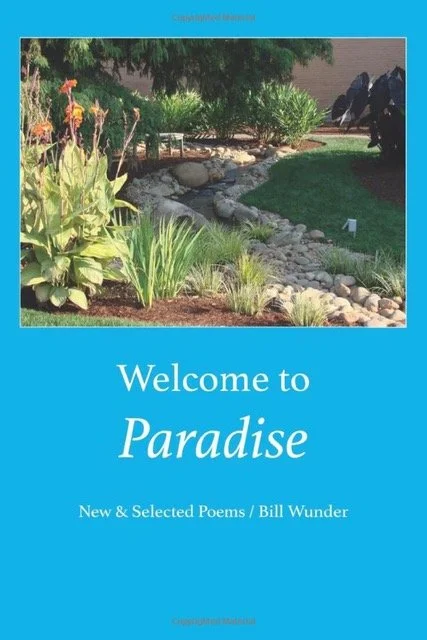Bill Wunder covers a lot of territory in Welcome to Paradise: New and Selected Poems, from the jungles of Vietnam to interpersonal relationships, and from to nature and its minions to the very cosmos.
Poems about the narrator’s experience in the Vietnam War are the hard-hitting, darkly shining stars of this fine collection. A Vietnam veteran, Wunder gives us an unvarnished look at the hard and horrifying realities of jungle warfare. In “Sniper,” the narrator is haunted by the memory of a dead combatant:
the sniper’s face, mouth
wide open, trying to
breathe back
his last gasp.
The narrator describes the deaths of one comrade after another. There’s Owens, who’s found tied to a tree with his throat cut in “Fireworks,” and Ignacio, who steps on a booby trap and has a moment to contemplate his inevitable fate before succumbing to it in “Ignacio Knew.”
In “Fireflies,” the narrator says,
I can’t figure out
how two VC emptied their clips at me
on the banks of the Ban Khe
and completely missed; why Madison, a big
quiet kid from Milwaukee, drowned
going for a swim in that same muddy river.
The poem articulates a question that winds its way through the book: “why/one man lives and another dies.”
Meanwhile, the narrator evinces deep doubt about the war. In “Dien Cai Dau,” he describes “Mama-san,” who “says we are crazy-in-the-head.” After saying “Tonight we leave base camp,” he adds:
Some of us will dull
our fear with dope. Some of us will never
be right again. Some will never come back.
We must be crazy to go out there each night.
He concludes, “Mama-san is right, we’re all Dien Cai Dau.”
Wunder eloquently illustrates the transformative effect of warfare on soldiers in “Replacements,” in which he describes young men newly arrived in Vietnam. They “think we are winning,” he says, and “have yet to slice off enemy ears/make them into a necklace.” Finally, he says, they “think they’ll make it out of here.”
The images and ideas of Paradise—which Wunder illustrates so effectively—haunt the reader as surely as the war haunts Wunder’s narrator. Even 40 years after leaving the battlefield, he grapples with the war’s unending aftermath and the unanswerable questions that linger about its losses.
In “Memorial Day, 2002,” Wunder describes a moment standing at the door of his attic, seeing what’s stored there (“fragments of fatigues/love beads we wore under them”) and reliving the sights, sounds and smells of Vietnam. And “Inheritance” describes another, cruel aspect of the war’s legacy: The narrator learns he’s at greater risk for serious diseases because of his exposure to defoliants. Wunder revisits this topic later in the book with the poem, “Dear Parkinson’s,” in which he writes, “Thanks for not stealing my sense of balance all at once/so I could get used to falling.”
War is the thread that winds through this collection, as integral to the book as it is to the narrator. But Wunder demonstrates a sure hand at writing about other topics, as well. The collection includes a number of what might be considered nature poems, though Wunder tends to bring the pieces back to a point of human importance. An excellent example is “Moose Sighting at Sunrise,” in which he describes a cow moose and her calf making their way in the woods. The poem takes a personal turn at the end: “If you hadn’t given up/on us, you’d have seen it too.”
Relationships also surface in other poems. An apparent mate struggles with cancer in “Burning Down the Village.” Childhood chums appear in multiple poems. And Wunder concludes the book with several poems about his father, including “Why I Didn’t Deliver My Father’s Graveside Eulogy.” In that piece, after the funeral, the family lights a candle of remembrance.
He’d be that breeze sneaking through
the kitchen window, trying
to blow out the skinny taper.
What light, so reliable
could ever be extinguished?
It seems that Wunder’s narrator may look outside himself for a source of meaning and order—especially in light of the seemingly chaotic losses he has witnessed. Astronomical bodies are recurring elements throughout the book—specifically, the moon and stars, which seem to stand in contrast to earthly realities. One notable poem is “Pointing at the Moon,” in which the narrator describes being in the jungle with a comrade and looking up to see “innumerable stars painted on/a Pollock sky.”
Miller thought that if he aimed right,
and if the drugs were pure enough,
one night his finger would touch the moon.
He never counted on that booby trap
blowing both his legs off, turning
the rice paddy around him a dull red.
Wunder demonstrates vast versatility in his subject matter, writing as eloquently about daffodils and songbirds as he does about heavier topics. His poems are highly accessible, their language almost deceptively simple.
This collection is both delicate and devastating, searing and stunning. Just as Wunder’s narrator appears irrevocably altered by his experiences, this book will leave a deep and indelible mark on its reader.
Abbey J. Porter writes poetry and memoir about people, relationships, and life struggles. She holds an MFA in creative writing from Queens University of Charlotte, an MA in liberal studies from Villanova University, and a BA in English from Gettysburg College. Abbey works in communications and lives in Cheltenham, Pa., with her two dogs.


